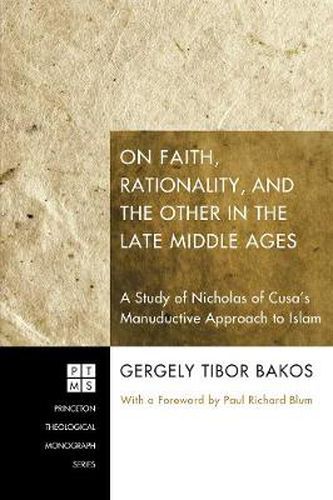Readings Newsletter
Become a Readings Member to make your shopping experience even easier.
Sign in or sign up for free!
You’re not far away from qualifying for FREE standard shipping within Australia
You’ve qualified for FREE standard shipping within Australia
The cart is loading…






This title is printed to order. This book may have been self-published. If so, we cannot guarantee the quality of the content. In the main most books will have gone through the editing process however some may not. We therefore suggest that you be aware of this before ordering this book. If in doubt check either the author or publisher’s details as we are unable to accept any returns unless they are faulty. Please contact us if you have any questions.
On Faith, Rationality, and the Other in the Late Middle Ages is an investigation of Nicholas of Cusa that seeks a deeper understanding of this important medieval intellectual and his importance for us today. One of Gergely Bakos’s primary aims in this study is to understand Nicholas of Cusa’s important and underexamined dimensions of his approach to dialogue with Islam. The framework and the methodology that informs this investigation was inspired by the late Professor Jos Decorte (1954-2001), a Flemish philosopher and mediaevalist at the Catholic University of Leuven in Belgium. Bakos carefully exposits his method of approaching medieval thought (Part One) and then applies and tests this method in practice (Part Two). The most extensive part of this study offers a sketch of the historical background of Nicholas’s dialogue with Islam and investigates what possibilities this approach offers. All of this is placed in dialogue with two other mediaeval approaches to Islam (Thomas Aquinas and Ramon Lull). The final chapters discuss Nicholas of Cusa’s project from a perspective offered by his mystical theology. The book culminates in an exploration of the possibilities of Nicholas of Cusa’s approach by testing the framework of the study. Finally, the author evaluates the application of his own approach (Part Three). The study ultimately has two purposes: to contribute to a better understanding of Nicholas of Cusa’s thought, on the one hand, and, on the other, to test a particular methodology and interpretative framework for the understanding of mediaeval culture.
$9.00 standard shipping within Australia
FREE standard shipping within Australia for orders over $100.00
Express & International shipping calculated at checkout
This title is printed to order. This book may have been self-published. If so, we cannot guarantee the quality of the content. In the main most books will have gone through the editing process however some may not. We therefore suggest that you be aware of this before ordering this book. If in doubt check either the author or publisher’s details as we are unable to accept any returns unless they are faulty. Please contact us if you have any questions.
On Faith, Rationality, and the Other in the Late Middle Ages is an investigation of Nicholas of Cusa that seeks a deeper understanding of this important medieval intellectual and his importance for us today. One of Gergely Bakos’s primary aims in this study is to understand Nicholas of Cusa’s important and underexamined dimensions of his approach to dialogue with Islam. The framework and the methodology that informs this investigation was inspired by the late Professor Jos Decorte (1954-2001), a Flemish philosopher and mediaevalist at the Catholic University of Leuven in Belgium. Bakos carefully exposits his method of approaching medieval thought (Part One) and then applies and tests this method in practice (Part Two). The most extensive part of this study offers a sketch of the historical background of Nicholas’s dialogue with Islam and investigates what possibilities this approach offers. All of this is placed in dialogue with two other mediaeval approaches to Islam (Thomas Aquinas and Ramon Lull). The final chapters discuss Nicholas of Cusa’s project from a perspective offered by his mystical theology. The book culminates in an exploration of the possibilities of Nicholas of Cusa’s approach by testing the framework of the study. Finally, the author evaluates the application of his own approach (Part Three). The study ultimately has two purposes: to contribute to a better understanding of Nicholas of Cusa’s thought, on the one hand, and, on the other, to test a particular methodology and interpretative framework for the understanding of mediaeval culture.